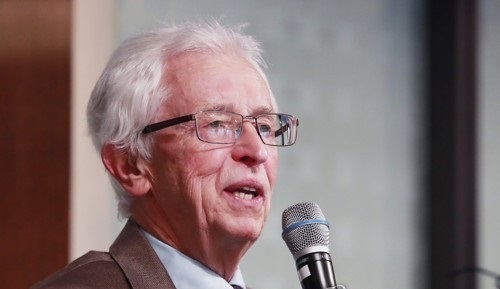N. Korea is clearly advancing H-bomb development: Hecker
By a2017001Published : June 27, 2017 - 15:26
North Korea clearly has the ability to produce tritium internally, a basic element for making hydrogen bombs, although the country has yet to weaponize it, an American nuclear expert said Tuesday.
"The evidence is quite clear that North Korea is able to produce tritium, which is necessary for a hydrogen bomb to create fusion. So you need tritium when you are going to have hydrogen bombs," Siegfried Hecker, a professor at Stanford University, told a group of journalists here.

During his 2010 trip to North Korea, he was allowed to take a look into the country's uranium-enrichment facility in Yongbyon.
North Korea claimed it used a hydrogen bomb when it conducted its fourth nuclear test in January last year, although it has not been proven.
"I believe they have made tritium. In fact, last year there have been some indications that they were trying to market one of the key ingredients for making tritium, something called lithium-6 ... So it's clear they know how to make tritium. We know that's official," he noted.
Also citing commercial satellite imagery, the nuclear expert also said that North Korea is adding at least one more tritium production facility to an old facility.
But he was negative about North Korea being able to weaponize the material. "They can make tritium so they have the basic element for a hydrogen bomb. But it takes much more than that to weaponize hydrogen bombs. I don't believe they can do that (yet)."
Hecker said the first step to denuclearize North Korea should start with a "no-use" agreement with the country to guarantee that Pyongyang would not use its nuclear weapons. Without the agreement, accidental launch, miscalculation or loss of control could wreak unimaginable damage on the Korean Peninsula, he said.
"Those possibilities are sufficiently worrisome that I maintain that the crisis is here now, not when they (North Korean missiles) are able to reach the US," according to Hecker.
"Once you do no-use,... then it's halt, roll back and eliminate," he said, indicating that the denuclearization process should be carried out in three phases. "It's (also) important for the US and South Korea to come to an agreement (on how to phase the process) before they would negotiate with North Korea."
Drawing on American college student Otto Warmbier, who died last week less than seven days after being released from a 17-month detention in North Korea, Hecker said that the event would weigh on the US administration's stated willingness to hold dialogue with North Korea.
"I think that what happened to Warmbier has put focus on three other Americans that are there (in North Korea). Getting them out becomes more important and an obstacle to moving down the path," he said. "I don't think it completely stopped it, but it's another roadblock or pothole."
In an earlier presentation given to a forum on North Korean nuclear issue, hosted by the Institute of Korean Studies, Hecker also said that North Korea appears to be in possession of enough nuclear fuel to make as many as 25 nuclear weapons in addition to the ability to produce about six or seven additional nuclear weapons every year. (Yonhap)










![[Hello India] Hyundai Motor vows to boost 'clean mobility' in India](http://res.heraldm.com/phpwas/restmb_idxmake.php?idx=644&simg=/content/image/2024/04/25/20240425050672_0.jpg&u=)








